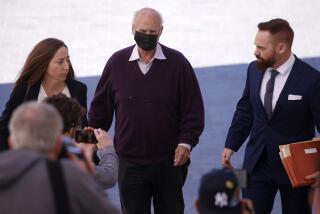Citron Says ‘Cognitive Defects’ Led to His Risky Investments
- Share via
With the benefit of hindsight and psychotherapy, former Orange County Treasurer Robert L. Citron testified he believes his mental deterioration began as early as 1989--five full years before his investments toppled the county into bankruptcy.
Indeed, Citron--once lauded as a genius, then disgraced when his treasury lost $1.6 billion--links brain disease diagnosed by his doctors to the very moment he began the investments that proved so foolish, four years before the collapse.
Telling his story under oath during 40 days of questioning from lawyers for Merrill Lynch and 10 days before other lawyers in 1997, Citron also said it was his loss of judgment that moved him to divert other agencies’ funds to a county account, according to documents released Wednesday.
“So when Mr. Raabe [assistant Orange County treasurer Matthew R. Raabe] came to me and suggested that we do this, I trusted Mr. Raabe. He was a certified public accountant, and I had no reason whatsoever at that time to believe what we did to be illegal in any way,” Citron said in testimony taken in the county’s recently settled lawsuit against Merrill Lynch.
The county so far has recovered $739 million as a result of litigation, including $420 million from Merrill Lynch.
“And then, in going back, in retrospect, I realized that a large part of the decision was because of my cognitive deficits, not being able to really rationalize and think out in my mind that major executive decision,” Citron testified.
The contention that his “cognitive deficit,” diagnosed after the county’s debacle, affected his judgment has been made before. Indeed, Citron submitted lengthy material from his psychologists and psychiatrists in arguing for a light sentence when he pleaded guilty to six felonies.
But while the problems previously were offered in mitigation of his behavior, Citron told lawyers for Merrill Lynch & Co., the target of a county lawsuit, that he believed they were directly responsible for him making the bad investments as far back as 1991.
That, he said, was when star Merrill Lynch salesman Michael G. Stamenson showed him how interest-sensitive securities issued by government agencies like Sallie Mae could immediately be put up as collateral to borrow more such securities, which then became collateral for still more purchases.
Merrill Lynch maintains that whatever Citron’s condition after the bankruptcy, his many detailed answers describing complicated financial transactions show he fully understood what he was doing.
The brokerage maintains it fully discharged its duties by advising him of the risks he was running and Citron’s ultimate decisions were his own.
During the depositions, however, many of his explanations of financial terms and transactions were highly convoluted and difficult to understand.
Merrill spokesman Bill Halldin characterized those descriptions as “detailed, not rambling.”
Citron’s lengthy explanations, often peppered with digressions, frequently seemed to test the attorneys’ patience--and prompted some humorous remarks.
Merrill Lynch attorney Ronald Olson asked the former treasurer to explain which incorrect strategy decision had resulted from his misfiring mental processes and received this answer:
“Well, the most major one is the one like--one of those like it happened yesterday, occurred in the first part of July of 1991, when Mr. Stamenson brought to me the first derivative--didn’t call them derivatives then.
“But principally it was a government agency issue, Sallie Mae--in which he said, after telling me about this prudent investment and the high rate of return that it had, he said to me, ‘Bob, what’s so wonderful about this investment is that it’s reversible.’
“Now, to give you the--to give you significant relativity to that statement, I must go back in time.”
At this point Citron’s lawyer, David Wiechert, cut in, addressing Olson:
“Do you want him to go back in time, Ron? I have no problem with him giving a narrative on this.”
Replied Olson: “Sure. We’ve got a lot of time.”
Citron’s descriptions of his mental condition were also highly involved.
“My understanding, as explained to me by Dr. Parker [his chief psychologist, Elizabeth S. Parker of the UC Irvine Center for Neuropsychology], is that the right front lobal part of the brain that we make executive decisions of all types, and that when the human being makes an executive decision, the brain goes through all parts of the brain where the information necessary to make this executive decision is stored at in different parts of the brain and then takes that information and audits it.”
Citron’s investments racked up huge winnings during a period of falling interest rates, but caused huge losses in 1994 when rates rose sharply.
Citron’s deposition began on Feb. 25, 1997, with a statement that homeopathic medications he was taking for prostate problems and hemorrhoids would not prevent him from answering questions fully and truthfully.
Questioned by Olson, Citron described how psychiatrists diagnosed him in early 1995:
“The depression could have begun in a gradual--a very gradual sense. Probably in 1993 and, unknownst to me, it became more intense in the early part of ‘94, and I guess reached its highest point and stayed there in the last quarter of ’94 into early ‘95, when I began treatment.”
More to Read
Inside the business of entertainment
The Wide Shot brings you news, analysis and insights on everything from streaming wars to production — and what it all means for the future.
You may occasionally receive promotional content from the Los Angeles Times.










